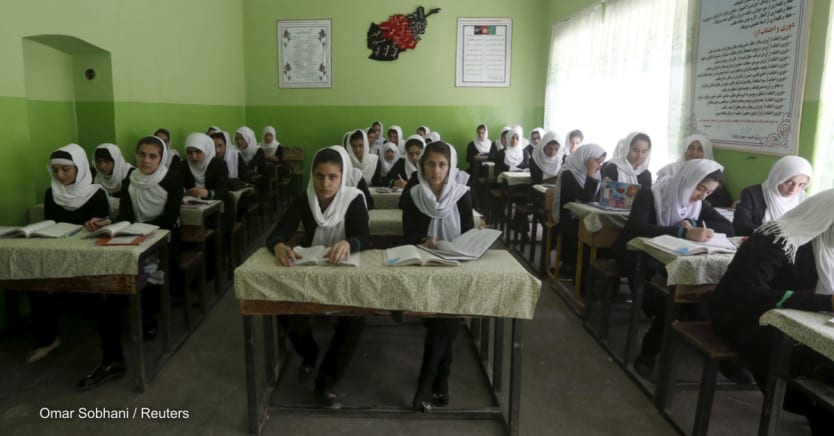
The European Union will make its financing for secondary education in Afghanistan conditional on girls’ right to attend, alarming aid groups that question whether the move will sway the Taliban or merely punish students.
Urpilainen: EU aid, tricky partners, and a possible return to Finland
Devex holds a rare one-on-one interview with the woman responsible for EU development spending.
Jutta Urpilainen, the commissioner for international partnerships, told the European Parliament’s development committee this week that “the EU will only offer education support at the secondary level in places where girls are guaranteed access to it.”
Urpilainen said the move was a response to recent “outrageous decisions” by the Taliban to prevent teenage girls from attending school and to order all women to cover their faces in public.
“These measures will not go unanswered,” she said. “The EU’s stance on gender equality is clear. Participation of women in public life, from education to the political and economic sectors, is crucial.”
After the Taliban took over the country last year, the European Commission responded with assistance channeled through United Nations agencies to avoid legitimizing the new government. This included emergency cash support to around 194,000 teachers via UNICEF.
A commission spokesperson told Devex by email this week that the UNICEF assistance was largely implemented during the winter months, before the school ban announcement in March. “This programme is now in the course of closing, with almost all this support having already been directly disbursed to the final beneficiaries (of which one third are women),” the spokesperson wrote.
An EU-supported World Food Programme effort to provide food at secondary schools is also paused as girls do not have equal access, the commission spokesperson added.
“Only around 20% of secondary school girls have access to education,” Urpilainen told the development committee Monday. “And that’s why we wanted to create this incentive in a way for those provinces which allow girls to attend secondary school.” Nine of Afghanistan’s 34 provinces currently allow girls to attend secondary education, Urpilainen said.
The commission’s latest move drew a mixed reaction from NGOs.
Afghanistan pledging conference falls $2B short
As fears for Afghanistan continue to rise, U.N. Secretary-General António Guterres calls for the international community to "halt the death spiral of the Afghan economy."
A spokesperson for the Norwegian Refugee Council told Devex by email that “aid conditionality, without a more nuanced plan to influence policy decisions or to even find out what conditions need to be in place to enable girls education risks drifting into collective punishment of all children in Afghanistan.”
“[It] is crucial for the EU to maintain dedicated support to education programming, with a special attention to the needs of women and girls,” the NRC spokesperson added.
Petros Kremonas, communications and campaigns coordinator at Plan International’s EU office, told Devex by email this week that Urpilainen’s decision “shows that our institutions can live up to commitments made in regards to our values.”
Yet Kremonas also acknowledged that if other international donors follow the EU’s lead, then Afghanistan’s already strained education system could come under even more pressure.
“Caught between a rock and a hard place, we find that this decision could work as an incentive for provinces to lift bans,” Kremonas wrote, adding that it should only be a short-term solution.
Responding to members of the European Parliament on Monday, Urpilainen reiterated her concern — shared with Devex in February — that there is still no common plan in Afghanistan between the likes of the World Bank, International Monetary Fund, United States, United Nations, and EU.
“We don’t have any illusions regarding the Taliban,” Urpilainen said, adding that their decisions are hard to predict due to rival factions within the group. She said her decision to make funding for secondary education conditional on girls’ attendance was one way to try to use “leverage” on the Taliban. The aim is to “explain to them that we are very serious with our values and with our asks,” Urpilainen said. “But I think the future will show us whether it has then an impact [on] them.”
Search for articles
Most Read
- 1
- 2
- 3
- 4
- 5








